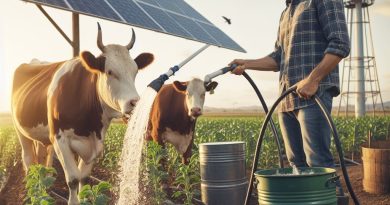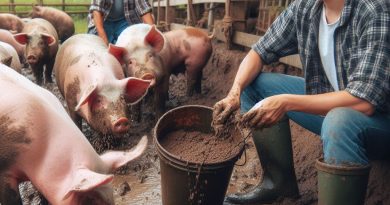Eco Sheep Farming: Key Points
Last Updated on March 2, 2024
Introduction
A. Definition and explanation of eco sheep farming
Eco sheep farming, a sustainable agricultural practice, focuses on minimizing environmental impact and promoting animal welfare.
It involves using eco-friendly methods, such as organic feed and rotational grazing, to maintain a balance between production and conservation.
This approach aims to reduce the use of chemicals and antibiotics, thereby promoting healthier sheep and eco-friendly agriculture.
B. Importance and relevance of eco-friendly agricultural practices
Eco-friendly agricultural practices, like eco sheep farming, play a crucial role in addressing pressing environmental issues.
These practices help preserve biodiversity, reduce greenhouse gas emissions, and protect soil and water resources.
By adopting sustainable farming methods, farmers can contribute to mitigating climate change, conserving natural resources, and ensuring food security.
In eco sheep farming, emphasis is placed on ethical treatment of animals, as they are allowed to graze on open pasturelands.
This provides them with a natural diet and allows for social interaction, promoting their overall welfare and health.
Additionally, farmers adhere to strict regulations to ensure the sheep are not subjected to unnecessary stress or harm.
Reducing the use of synthetic chemicals in sheep farming also has health benefits for consumers.
By choosing products from eco sheep farming, individuals can reduce their exposure to potentially harmful substances.
These products are often nutritionally superior and free from residues, making them a healthier choice.
Therefore, eco sheep farming offers a sustainable and responsible approach to agriculture by prioritizing the environment, animal welfare, and consumer health.
Embracing eco-friendly practices in sheep farming not only preserves our planet’s resources but also provides high-quality products for consumers.
Benefits of Eco Sheep Farming
Eco sheep farming offers various benefits, such as reduced environmental impact, preservation of biodiversity, and improved soil health and fertility.
A. Reduced environmental impact
An eco-friendly approach to sheep farming can significantly minimize its environmental impact.
By adopting sustainable practices, such as organic feed and natural pest control methods, farmers can reduce the use of harmful chemicals.
Additionally, eco sheep farming promotes responsible waste management, thus preventing pollution of water sources and reducing carbon emissions.
B. Preservation of biodiversity
One of the key advantages of eco sheep farming is the preservation of biodiversity.
Traditional farming methods often involve the use of pesticides and herbicides, which can harm beneficial insects and plants.
In contrast, eco sheep farming focuses on creating a balanced ecosystem, allowing native plants and animals to thrive.
This approach not only preserves biodiversity but also contributes to a healthier and more resilient agricultural system.
C. Improved soil health and fertility
Another important benefit of eco sheep farming is the improved soil health and fertility it offers.
Through practices like rotational grazing, managed intensively, farmers can prevent overgrazing and soil erosion.
This allows the soil to regain its natural fertility, resulting in healthier pastures and more nutritious feed for the sheep.
Moreover, eco sheep farming promotes the use of organic fertilizers, which enrich the soil without introducing harmful chemicals.
In addition to these benefits, eco sheep farming also supports local economies and promotes sustainable livelihoods.
By encouraging small-scale farming and local markets, it helps create jobs and strengthens rural communities.
Consumers who prioritize eco-friendly products are willing to pay a premium for ethically raised sheep, supporting the sustainability of the farming industry.
Most importantly, eco sheep farming offers numerous advantages, including reduced environmental impact, preservation of biodiversity, and improved soil health.
By adopting sustainable practices, farmers can contribute to a healthier planet while also reaping economic benefits.
Furthermore, consumers who choose eco sheep products can support this industry and enjoy nutritious and ethically produced meat and wool.
Read: Holistic Cattle Care Techniques
Sustainable Grazing Practices
Eco sheep farming is a sustainable way to raise sheep while minimizing the negative impact on the environment.
There are several key points to consider when practicing eco-friendly sheep farming.
- Rotational grazing techniques involve dividing pastureland into smaller sections and rotating the sheep between them. This allows for better utilization of the available forage and prevents overgrazing.
- Utilization of diverse forage plants helps in maintaining a healthy pasture. Different plants have different growth patterns and nutrient requirements, which helps to ensure that the sheep get a balanced diet while also promoting biodiversity.
- Proper management of pastureland involves monitoring the condition of the pasture and taking necessary steps to restore its health. This includes reseeding bare patches, controlling weeds, and minimizing soil erosion.
A. Benefits of Rotational Grazing
- Rotational grazing provides numerous benefits for both the sheep and the environment. It helps to prevent overgrazing by allowing sufficient time for the pasture to recover between grazing periods.
- The movement of the sheep to different sections of the pasture promotes even distribution of their manure, which results in improved nutrient cycling and reduces the risk of nutrient overload in certain areas.
- Rotational grazing also helps to break the life cycles of parasites, as the sheep are moved to new areas before the parasite larvae have a chance to mature and reinfect the animals. This reduces the reliance on chemical dewormers.
B. Importance of Diverse Forage Plants
- Utilizing diverse forage plants benefits the overall health and productivity of the sheep. Different plants offer varying nutritional profiles, ensuring that the sheep receive a well-balanced diet.
- Diverse forage plants also enhance the soil quality by improving organic matter content and water retention capacity. They provide a habitat for beneficial insects, birds, and microorganisms, contributing to the overall ecosystem health.
- Additionally, diverse forage plants help to reduce the risk of weed infestations. Robust and healthy pasture can outcompete weeds, reducing the need for herbicides and manual weed control.
C. Proper Pasture Management
- Regular monitoring of pasture conditions is crucial to maintaining a healthy ecosystem. This involves observing the overall vegetation cover, identifying plant species, and assessing soil health.
- Reseeding bare patches with suitable forage species helps to restore the productivity of the pasture. It is important to select appropriate plant species that are well-suited for the local climate and soil conditions.
- Effective weed control methods, such as mowing or hand pulling, should be implemented to prevent the spread of invasive plant species. This ensures that resources are allocated to desirable forage plants.
In essence implementing sustainable grazing practices, utilizing diverse forage plants, and properly managing pastureland are the key points of eco sheep farming.
By adopting these practices, farmers can achieve a balance between productivity and environmental stewardship, ensuring the long-term viability of sheep farming while preserving the natural resources.
Read: Green Goat Farming Methods
Natural Feed and Nutrition
A. Utilization of Organic and Locally Sourced Feed
In eco sheep farming, the emphasis is on sustainable practices, starting with feeding.
Opt for organic feed sourced locally to support nearby farmers and reduce the carbon footprint.
- Choose organic grains: Incorporate locally produced organic grains to provide essential nutrients without harmful pesticides or synthetic additives.
- Explore forage options: Utilize diverse forage options from your region, enhancing the diet with natural goodness and minimizing the need for external inputs.
- Crop residues as feed: Reuse crop residues as feed, reducing waste and promoting a closed-loop system that benefits both the environment and the flock.
B. Balanced Diet for Sheep
Maintaining a well-balanced diet is crucial for the health and productivity of your sheep.
A varied and nutritious diet supports growth, reproduction, and overall vitality.
- Mix of grasses and legumes: Offer a mix of grasses and legumes to ensure a well-rounded diet, providing essential proteins and fiber for optimal digestion.
- Adequate minerals and vitamins: Ensure your sheep receive the necessary minerals and vitamins, either through natural forage or supplemental feed, to prevent deficiencies and promote robust health.
- Monitor body condition: Regularly assess the body condition of your sheep to adjust their diet accordingly, ensuring they receive adequate nutrition without excess, which could lead to health issues.
C. Prevention of Overgrazing and Soil Degradation
Sustainable farming involves responsible land management to prevent overgrazing and soil degradation.
Implementing eco-friendly practices safeguards the ecosystem for future generations.
- Rotational grazing: Implement rotational grazing to prevent overgrazing, allowing pastures to recover and promoting biodiversity in the ecosystem.
- Soil health maintenance: Focus on maintaining soil health through practices such as cover cropping and minimal tillage, preventing erosion and ensuring the long-term productivity of the land.
- Strategic pasture management: Plan and manage pastures strategically, considering the nutritional needs of the flock and the ecological impact on the land, fostering a harmonious balance between agriculture and nature.
In a nutshell, adopting natural feed and nutrition practices in eco sheep farming not only benefits the flock but also contributes to a more sustainable and resilient agricultural system.
Read: Organic Poultry: Best Practices

Animal Welfare and Health
When it comes to eco sheep farming, animal welfare and health are of utmost importance.
The practice focuses on promoting the well-being of the sheep in a natural and sustainable way.
This ensures that the sheep are healthy, happy, and able to thrive in their environment.
A. Reduced use of antibiotics and chemicals
One key aspect of eco sheep farming is the reduced use of antibiotics and chemicals.
The goal is to minimize the reliance on these substances and to find alternative methods for promoting sheep health.
This is done through preventative measures and natural remedies.
B. Provision of adequate shelter and clean water
In eco sheep farming, providing adequate shelter and clean water for the sheep is crucial.
A comfortable and safe shelter protects the sheep from extreme weather conditions and predators.
Clean water is essential for their hydration and overall health.
C. Regular monitoring and preventive healthcare
To ensure the well-being of the sheep, regular monitoring and preventive healthcare measures are implemented.
This includes regular check-ups by veterinarians, vaccination programs, and deworming protocols.
Early detection of health issues helps in providing prompt treatment and minimizing the use of antibiotics.
Overall, eco sheep farming prioritizes the health and welfare of the animals, while also considering the environmental impact of the farming practices.
By adopting sustainable measures, farmers can ensure the long-term health and productivity of their sheep.
Here are some key points to remember:
- Eco sheep farming promotes animal welfare and health in a sustainable manner.
- The practice focuses on reducing the use of antibiotics and chemicals.
- Adequate shelter and clean water are provided for the sheep’s well-being.
- Regular monitoring and preventive healthcare measures are implemented.
- Early detection of health issues helps minimize antibiotic use.
- Eco sheep farming is a holistic approach that considers the environment and animal welfare.
In short, eco sheep farming is not just about producing high-quality products, but also about ensuring the welfare and health of the animals involved.
By prioritizing animal welfare and reducing the use of antibiotics and chemicals, farmers can contribute to a more sustainable and environmentally friendly agriculture industry.
Remember, happy and healthy sheep lead to a better and more sustainable future for all.
Read: Ethical Pig Farming Essentials
Find Out More: Sustainable Rabbit Farming 101
Uncover the Details: Lambing Guide: Best Practices
Eco-Friendly Infrastructure
A. Efficient waste management systems
Eco sheep farming is an innovative approach that prioritizes sustainable and environmentally friendly practices.
To achieve this, eco-friendly infrastructure plays a crucial role on the farm.
Designing and implementing efficient waste management systems is one key aspect of eco-friendly infrastructure.
These systems ensure that waste generated from the farm is properly handled and disposed of, minimizing its impact on the environment.
By segregating waste materials and utilizing composting techniques, farmers can convert organic waste into nutrient-rich fertilizers, reducing the need for chemical-based alternatives.
B. Water conservation measures
Water conservation measures are another important consideration in eco sheep farming.
Implementing techniques such as drip irrigation and rainwater harvesting helps reduce water consumption on the farm.
Drip irrigation delivers water directly to the roots of plants, minimizing water wastage through evaporation or runoff.
Additionally, collecting rainwater in storage tanks during the wet seasons ensures a sustainable water supply during drier periods.
These measures not only conserve water but also contribute to the overall health of the ecosystem.
C. Renewable energy utilization on the farm
Renewable energy utilization is a fundamental part of eco-friendly infrastructure.
By harnessing renewable energy sources like solar or wind power, farmers can reduce their dependency on fossil fuels and decrease greenhouse gas emissions.
Installing solar panels on buildings or utilizing wind turbines generates clean and sustainable energy to power various farm operations.
This transition to renewable energy sources not only benefits the environment but also helps reduce long-term energy costs for the farmer.
Efficient waste management, water conservation, and renewable energy utilization are interconnected in eco sheep farming.
These practices create a harmonious and sustainable system that supports the well-being of the farm, its animals, and the surrounding environment.
Embracing eco-friendly infrastructure is a step towards a more sustainable and resilient agriculture sector.
Through the implementation of eco-friendly infrastructure, eco sheep farmers are not only minimizing their environmental impact but also creating a more resilient and self-sufficient farming system.
This approach allows farmers to adapt to climate change, reduce production costs, and contribute to a healthier planet.
Eco sheep farming is not just about raising sheep but about nurturing a sustainable and thriving ecosystem.
By embracing these key points, farmers pave the way for a more sustainable future in agriculture.
Collaborations and Partnerships
Eco sheep farming is more than just a sustainable method of producing wool and meat.
It also promotes collaborations and partnerships with various stakeholders.
Through these partnerships, eco sheep farmers can foster a sense of community, enhance conservation efforts, and exchange valuable knowledge for the betterment of the industry.
A. Engagement with Local Communities and Conservation Organizations
- Collaborating with local communities is essential for eco sheep farmers to build trust and mutual understanding.
- By engaging with local communities, farmers can address concerns and ensure their practices align with community values.
- Partnerships with conservation organizations can provide eco sheep farmers with access to resources and expertise in preserving natural habitats.
- Together with these organizations, farmers can develop conservation plans that protect biodiversity and mitigate environmental impact.
B. Sharing and Learning from Other Eco Sheep Farming Projects
- Eco sheep farmers can benefit greatly from sharing experiences and knowledge with fellow farmers.
- By exchanging ideas and best practices, farmers can overcome challenges and implement innovative solutions.
- Collaborative networks and platforms enable farmers to learn from successful sustainable sheep farmingprojects worldwide.
- This knowledge-sharing fosters continuous improvement and ensures the industry remains sustainable in the long run.
C. Implementing and Promoting Sustainable Practices Together
- Collaborations and partnerships in sustainable sheep farming facilitate the widespread adoption of sustainable practices.
- Through collective efforts, farmers can streamline production processes to minimize waste and reduce carbon footprint.
- Sharing resources and infrastructure among farmers can optimize efficiency and resource utilization.
- Collaborations also pave the way for joint marketing initiatives, promoting eco-friendly products to conscientious consumers.
In review, collaborations and partnerships play a vital role in the success of eco sheep farming.
By engaging with local communities and conservation organizations, farmers can ensure their practices align with environmental values and contribute to conservation efforts.
Sharing experiences and knowledge among farmers enables continuous improvement and innovation.
Collaborating in the implementation of sustainable practices promotes efficiency, reduces waste, and contributes to a greener future for the sheep farming industry.
Conclusion
A. Recap of the key points discussed
Eco sheep farming offers numerous benefits for both farmers and the environment.
Throughout this section, we have discussed several key points that highlight the advantages of this sustainable agricultural practice.
Firstly, eco sheep farming promotes soil health and fertility through the use of organic fertilizers and rotational grazing.
This not only improves the quality of the land but also reduces the need for harmful chemicals and synthetic additives.
Secondly, adopting eco sheep farming practices helps in reducing greenhouse gas emissions.
By allowing sheep to graze on natural grasslands, carbon sequestration occurs, mitigating the impact of climate change.
Additionally, eco sheep farming promotes biodiversity and supports native plant species by allowing them to thrive alongside grazing sheep.
This helps in creating a balanced ecosystem and preserving fragile habitats.
Lastly, eco sheep farming offers economic benefits for farmers by reducing input costs and increasing the demand for organic and sustainably produced products.
B. Encouragement for farmers to adopt eco sheep farming practices
It is essential for farmers to consider adopting eco sheep farming practices.
Not only will they contribute to a healthier environment, but they will also have the opportunity to tap into a growing market for sustainable and ethically produced food products.
C. Call to action for readers to support and promote sustainable agriculture
In order to promote sustainable agriculture and support eco sheep farming, it is crucial for readers to take action.
This can be done by choosing to buy organic and locally sourced sheep products, advocating for sustainable farming practices within their communities, and supporting organizations that work towards promoting sustainable agriculture.
By collectively supporting eco sheep farming, we can contribute to a more sustainable and environmentally-friendly future for both farming practices and the overall well-being of our planet.


